北师大版(2019)选择性必修 第一册Unit 3 Conservation Lesson 1The Sixth Extinction 课件 (共37张PPT)
文档属性
| 名称 | 北师大版(2019)选择性必修 第一册Unit 3 Conservation Lesson 1The Sixth Extinction 课件 (共37张PPT) |
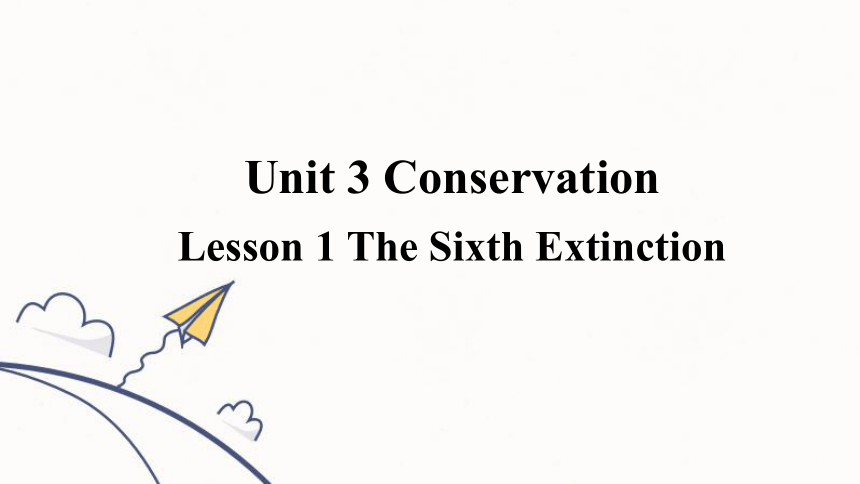
|
|
| 格式 | pptx | ||
| 文件大小 | 25.0MB | ||
| 资源类型 | 教案 | ||
| 版本资源 | 北师大版(2019) | ||
| 科目 | 英语 | ||
| 更新时间 | 2024-10-12 22:31:32 | ||
图片预览


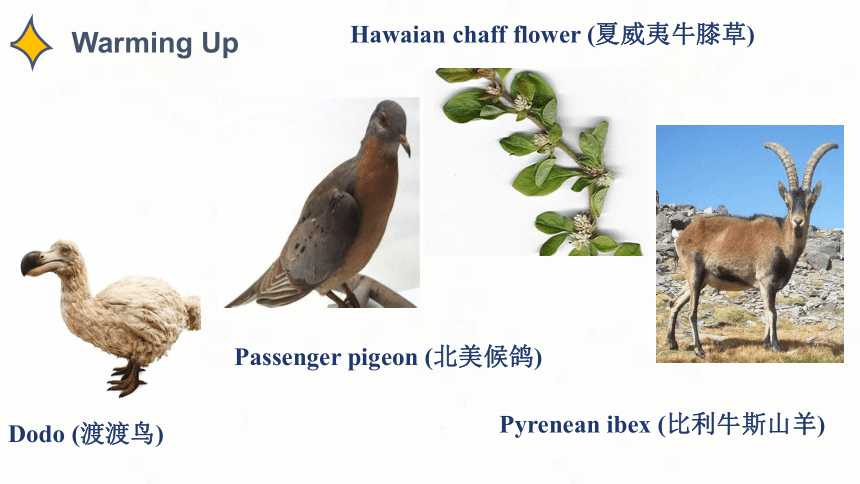
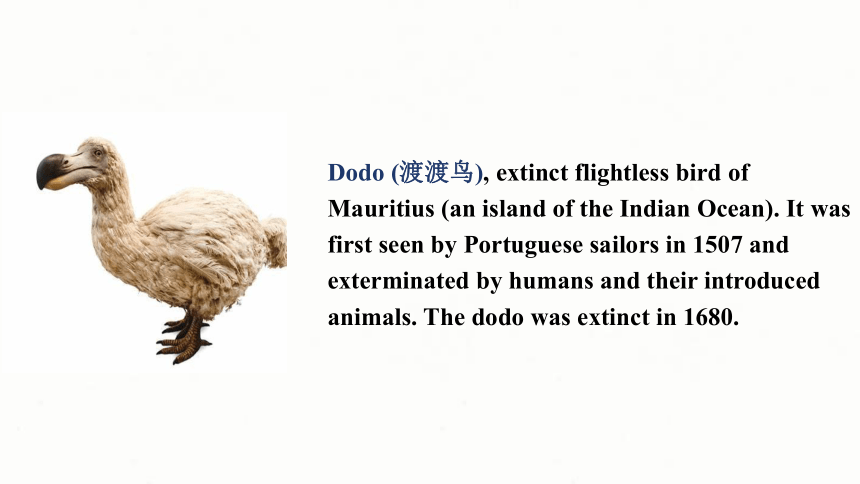
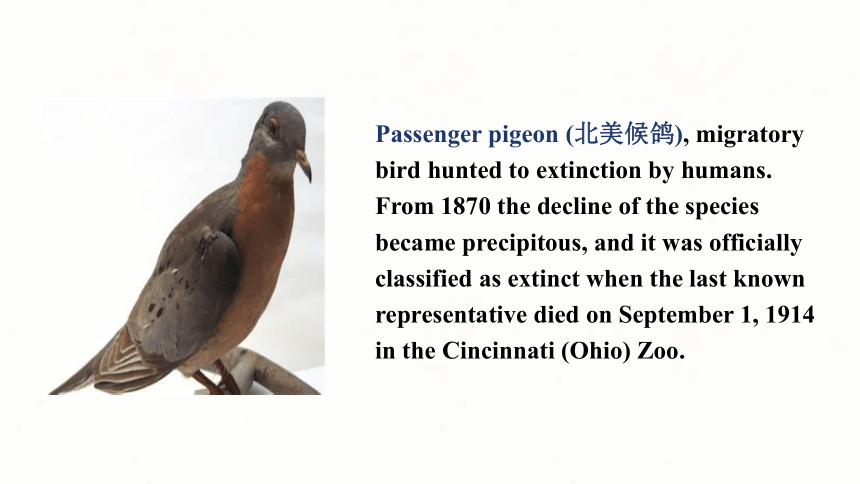
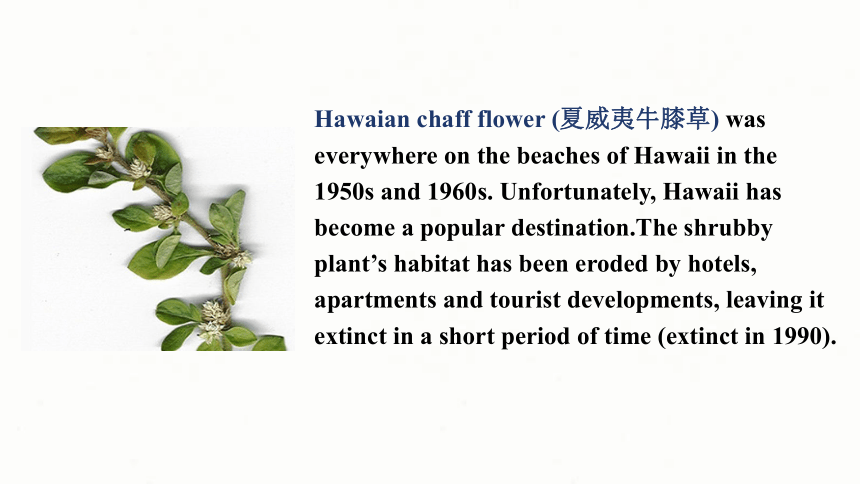

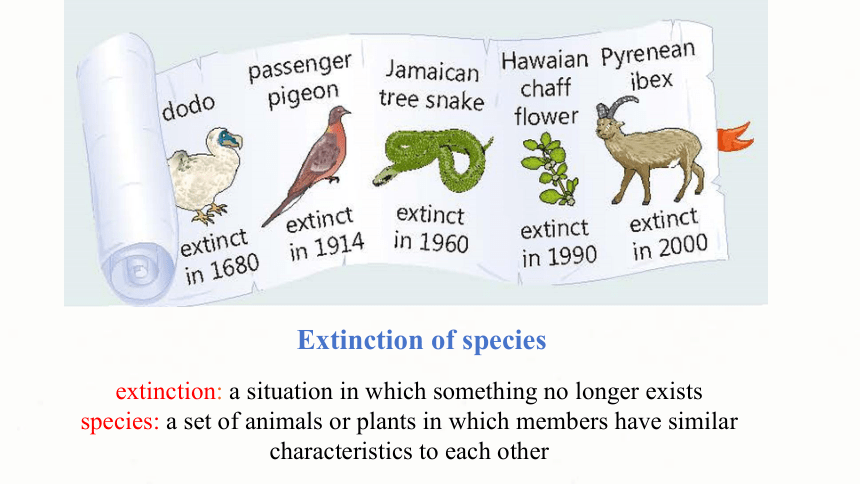

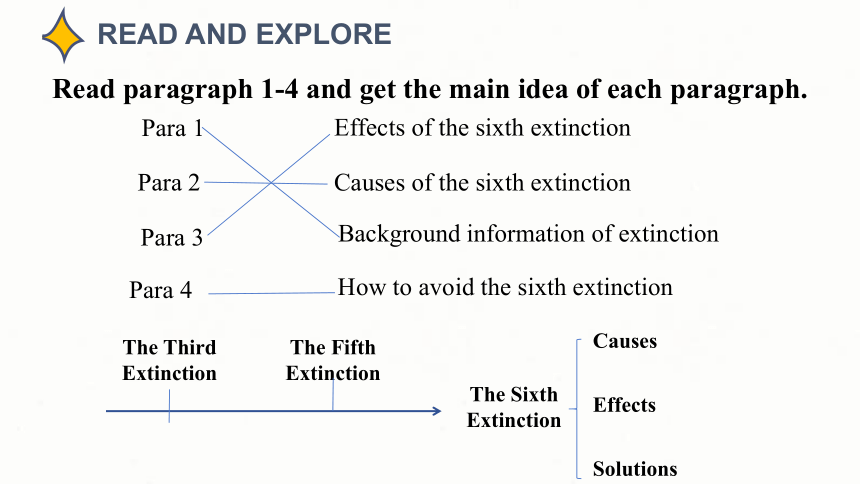
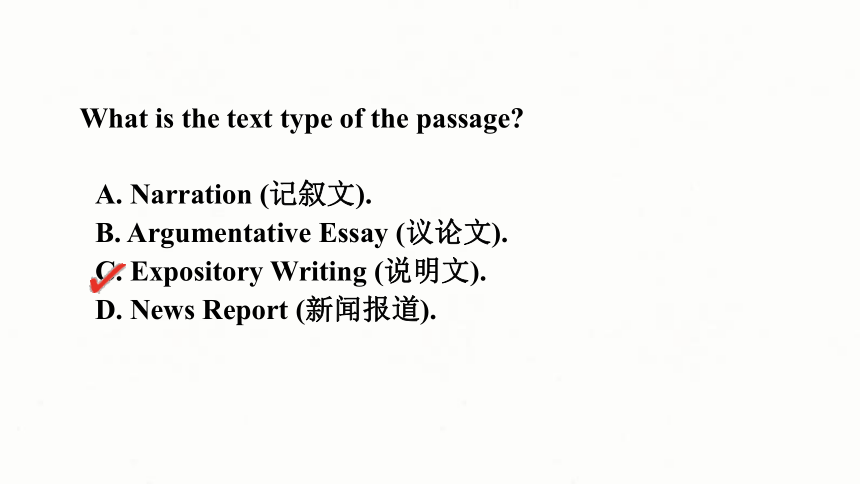
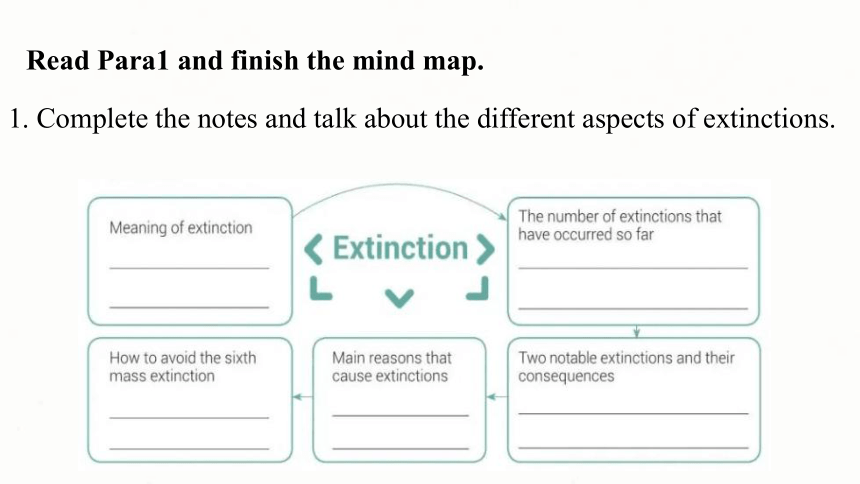
文档简介
(共37张PPT)
Lesson 1 The Sixth Extinction
Unit 3 Conservation
1.To read and talk about conservation;
2.To read for general understanding;
3.To read for specific information and understanding words in the context;
4.To express solutions to environmental problems.
Learning objectives
Dodo (渡渡鸟)
Passenger pigeon (北美候鸽)
Hawaian chaff flower (夏威夷牛膝草)
Pyrenean ibex (比利牛斯山羊)
Warming Up
Dodo (渡渡鸟), extinct flightless bird of Mauritius (an island of the Indian Ocean). It was first seen by Portuguese sailors in 1507 and exterminated by humans and their introduced animals. The dodo was extinct in 1680.
Passenger pigeon (北美候鸽), migratory bird hunted to extinction by humans. From 1870 the decline of the species became precipitous, and it was officially classified as extinct when the last known representative died on September 1, 1914 in the Cincinnati (Ohio) Zoo.
Hawaian chaff flower (夏威夷牛膝草) was everywhere on the beaches of Hawaii in the 1950s and 1960s. Unfortunately, Hawaii has become a popular destination.The shrubby plant’s habitat has been eroded by hotels, apartments and tourist developments, leaving it extinct in a short period of time (extinct in 1990).
Pyrenean ibex (比利牛斯山羊), once commonly found in Southern France, Northern Pyrenees and Cantabrian Mountains, was one of the four subspecies of Iberian wild goat or Spanish ibex. They were found in huge numbers even a few hundred years ago. However, by 1900 the numbers went down to less than 100, and after 1910, the number never went up above 40. The last Pyrenean ibex was Celia, a female, found dead in the year 2000.
Extinction of species
extinction: a situation in which something no longer exists
species: a set of animals or plants in which members have similar characteristics to each other
How much do you know about extinction Answer the question based on your knowledge.
1. How many times up to today has life on Earth almost died out
a Once. b Five times. c More than 10 times.
2. About what percent of all species on Earth became extinct during the mass extinction known as the “Great Dying”
a Less than 10%. b Nearly 50%. c More than 90%.
3. What do scientists think will cause the next mass extinction
a Human activity. b Natural causes. c Unknown reasons.
ACTIVATE AND SHARE
Para 1
Para 2
Para 3
Para 4
Read paragraph 1-4 and get the main idea of each paragraph.
Background information of extinction
Causes of the sixth extinction
Effects of the sixth extinction
How to avoid the sixth extinction
The Third Extinction
The Fifth Extinction
The Sixth Extinction
Causes
Effects
Solutions
READ AND EXPLORE
What is the text type of the passage
A. Narration (记叙文).
B. Argumentative Essay (议论文).
C. Expository Writing (说明文).
D. News Report (新闻报道).
Read Para1 and finish the mind map.
1. Complete the notes and talk about the different aspects of extinctions.
Read Para1
1.Meaning of extinction:
2.The number of extinctions occurred so far:
Extinctions, where entire species are wiped out, are not unusual in our Earth’s history. In fact, over 90 percent of all species that ever lived are now extinct. In the last 500 million years, there have been five times when life on Earth has almost ended. These include the third mass extinction, known as the “Great Dying”, which killed 90% to 96% of all species. And the fifth event, which occurred 66 million years ago, caused the death of the dinosaurs.
3.Two notable extinctions and their consequences:
4.Main reasons that cause extinctions:
The reasons for extinctions are varied. According to scientists, they include volcanic eruptions, asteroids hitting the Earth from space, changes in sea levels,the decrease of the oxygen content of the sea and global warming. Many scientists say we are now entering the Earth’s sixth mass extinction. This time, human activity will be to blame.
1. Which of the following is not included in the causes for the last five extinctions ( )
A. Global warming.
B. Volcanic eruptions.
C. The decrease of the oxygen content of the sea.
D. Human activity.
D
Read Para1 to choose the right answer.
2. What is one of the reasons for extinction ( )
A. Sleep of volcano.
B. Changes in sea levels.
C. Rise in oxygen.
D. Drop in temperature.
B
Read Para1 to choose the right answer.
Biological Extinction in Earth History 生物大灭绝
白垩纪-古近纪灭绝事件
恐龙大灭绝
Cretaceous–Paleogene extinction event
奥陶纪-志留纪灭绝事件
Ordovician–Silurian extinction event
三叠纪-侏罗纪灭绝事件
Triassic–Jurassic extinction event
泥盆纪大灭绝
Late Devonian extinction
二叠纪-三叠纪灭绝事件
Permian–Triassic extinction event / Great Dying
Biological Extinction in Earth History 生物大灭绝
Read Para2 and answer the questions
1. What did scientists find out in 2015
2. Why so many species are dying out
3.Why does the writer think the sixth mass extinction will come
Although it is not unusual for species to die out naturally, the rate at which this is now happening is cause for concern. A 2015 study by scientists who were based at Brown University and Duke University in the US, looked at how quickly species die out due to natural causes, that is, the “background extinction rate”. They found that human activity is causing species to die out 1,000 times faster than normal. There is a long list of reasons why so many species are dying out: air and water pollution, forests being destroyed, factory farming and overfishing. It is clear that human activity has negatively affected all other species on Earth, including animals and plants.
3. What are scientists mainly concerned about as to reasons of species death ( )
A. Ages.
B. Ways.
C. Numbers.
D. Rates.
D
Read Para2 to choose the right answer.
4. Which of the following doesn’t belong to human activity ( )
Deforestation.
B. Air and water pollution.
C. Changes in sea levels.
D. Overfishing.
C
Read Para2 to choose the right answer.
Read Para3 and answer the questions
1. Why does the writer believe we’ll probably die out if 75% of the Earth’s species die out
If a sixth mass extinction occurs, scientists who have studied the issue believe that up to three quarters of all species on Earth could die out. Of course, as we humans depend on so many species for our survival, we would also be at risk of dying out. Our world and our lives depend on the balance in nature between animals and plants. Without forests, we would have no air to breathe, and without clean water we would be unable to survive.
Read Para4 and answer the questions
1. How to avoid the sixth mass extinction?
Can a sixth extinction be avoided Experts say that it is not yet too late, if we take action now. This would mean we have to significantly change the way we live. For example, we need to take steps to save endangered species, including setting up special areas where plants and animals can be protected. We need to change how we work and travel by using cleaner, more natural sources of energy, such as wind and solar energy. We also need to improve our farming methods to reduce water, air and land pollution. In short, if we want to survive, we need to stop destroying the planet that we live on and start to protect it.
5. How can we avoid the sixth extinction ( )
A. By producing more species.
B. By stopping destroying the planets.
C. Bys taking action to protect ourselves.
D. By moving to another planet immediately.
B
Read Para4 to choose the right answer.
6.What is the purpose of the last paragraph ( )
A. Appeal to people to protect the Earth.
B. Blame people for destroying the environment.
C. Urge the government to take action.
D. Warn the public to reduce their destructive behaviour.
A
Read Para4 to choose the right answer.
7. What is the author’s attitude towards the mass extinction in this passage ( )
A. Uninterested
B. Concerned.
C. Skeptical.
D. Supportive
B
Read Para4 to choose the right answer.
Read the Case Study and answer the questions
1.What did people do in the case study to protect black robins
2. Which claim(s) did the case study support in the text
The Black Robin
Black robins are the birds that humans saved from extinction. In 1980, there were only five black robins left in the world. They all lived on a small island off the coast of New Zealand. Only one of those birds, a female called Old Blue, was able to lay eggs. Wildlife workers began a programme for raising black robin chicks. They protected Old Blue’s eggs, helped them to hatch, and took care of the chicks.(幼鸟) Thanks to their efforts, there are now more than 250 black robins, and the population(数量) is spreading. To help them survive, people are restoring their habitats and removing small animals that hunt them, such as mice and cats from the islands where they live.
Case Study
robin n. 知更鸟
habitat n. 栖息地
限制性定语从句
定语
多亏,由于
限制性定语从句
Read the Case Study and answer the questions
1.What did people do in the case study to protect black robins
2. Which claim(s) did the case study support in the text
The case study showed that even in desperate situations, we can do something to help. In short, it’s never too late.
Complete the paragraph about extinctions using the correct form of the phrases below.
die out be known as have affected depend on wipe out
take steps take actions set up take care of
In the last 500 million years, there have been five mass extinction events on Earth. In the third event, which 1______________ the “Great Dying”, 90% to 96% of all species ___2___________. Of course, species died out due to many causes. But nowadays, human activity _3_____________ all types of species that we ___4___________ for living. We need to __5____________ to avoid the sixth mass extinction. We should _6_____________ to save endangered animals and plants, and _7_____________ special areas to______________ them before the next extinction comes that may _9 _____________ the entire species.
is known as
died out
has affected
depend on
take action
take steps
set up
8 take care of
wipe out
SUMMARY
The Six
Extinction
Background history
Causes
Effects
Solutions
We need to live in a green way.
REVIEW
REVEIW:
ENJOY A SONG
As a student, what you can do to avoid the sixth extinction
reduce waste
put rubbish into separate dustbins
cycle or take public transportation
use fewer plastic bags while going shopping
Reduce
Reuse
Recycle
THINK AND SHARE
Group Work
假定你是李华,你校即将举行主题为“Let’s go green now”的英语演讲比赛。请你用英语写一篇演讲稿,要点包括:
1. 倡导绿色生活的原因;
2. 实践途径(至少三点)。
注意:1.词数100左右;
2.可以适当增加细节,以使行文连贯;
3.开头和结尾已给出,但不计入总词数。
Homework
Lesson 1 The Sixth Extinction
Unit 3 Conservation
1.To read and talk about conservation;
2.To read for general understanding;
3.To read for specific information and understanding words in the context;
4.To express solutions to environmental problems.
Learning objectives
Dodo (渡渡鸟)
Passenger pigeon (北美候鸽)
Hawaian chaff flower (夏威夷牛膝草)
Pyrenean ibex (比利牛斯山羊)
Warming Up
Dodo (渡渡鸟), extinct flightless bird of Mauritius (an island of the Indian Ocean). It was first seen by Portuguese sailors in 1507 and exterminated by humans and their introduced animals. The dodo was extinct in 1680.
Passenger pigeon (北美候鸽), migratory bird hunted to extinction by humans. From 1870 the decline of the species became precipitous, and it was officially classified as extinct when the last known representative died on September 1, 1914 in the Cincinnati (Ohio) Zoo.
Hawaian chaff flower (夏威夷牛膝草) was everywhere on the beaches of Hawaii in the 1950s and 1960s. Unfortunately, Hawaii has become a popular destination.The shrubby plant’s habitat has been eroded by hotels, apartments and tourist developments, leaving it extinct in a short period of time (extinct in 1990).
Pyrenean ibex (比利牛斯山羊), once commonly found in Southern France, Northern Pyrenees and Cantabrian Mountains, was one of the four subspecies of Iberian wild goat or Spanish ibex. They were found in huge numbers even a few hundred years ago. However, by 1900 the numbers went down to less than 100, and after 1910, the number never went up above 40. The last Pyrenean ibex was Celia, a female, found dead in the year 2000.
Extinction of species
extinction: a situation in which something no longer exists
species: a set of animals or plants in which members have similar characteristics to each other
How much do you know about extinction Answer the question based on your knowledge.
1. How many times up to today has life on Earth almost died out
a Once. b Five times. c More than 10 times.
2. About what percent of all species on Earth became extinct during the mass extinction known as the “Great Dying”
a Less than 10%. b Nearly 50%. c More than 90%.
3. What do scientists think will cause the next mass extinction
a Human activity. b Natural causes. c Unknown reasons.
ACTIVATE AND SHARE
Para 1
Para 2
Para 3
Para 4
Read paragraph 1-4 and get the main idea of each paragraph.
Background information of extinction
Causes of the sixth extinction
Effects of the sixth extinction
How to avoid the sixth extinction
The Third Extinction
The Fifth Extinction
The Sixth Extinction
Causes
Effects
Solutions
READ AND EXPLORE
What is the text type of the passage
A. Narration (记叙文).
B. Argumentative Essay (议论文).
C. Expository Writing (说明文).
D. News Report (新闻报道).
Read Para1 and finish the mind map.
1. Complete the notes and talk about the different aspects of extinctions.
Read Para1
1.Meaning of extinction:
2.The number of extinctions occurred so far:
Extinctions, where entire species are wiped out, are not unusual in our Earth’s history. In fact, over 90 percent of all species that ever lived are now extinct. In the last 500 million years, there have been five times when life on Earth has almost ended. These include the third mass extinction, known as the “Great Dying”, which killed 90% to 96% of all species. And the fifth event, which occurred 66 million years ago, caused the death of the dinosaurs.
3.Two notable extinctions and their consequences:
4.Main reasons that cause extinctions:
The reasons for extinctions are varied. According to scientists, they include volcanic eruptions, asteroids hitting the Earth from space, changes in sea levels,the decrease of the oxygen content of the sea and global warming. Many scientists say we are now entering the Earth’s sixth mass extinction. This time, human activity will be to blame.
1. Which of the following is not included in the causes for the last five extinctions ( )
A. Global warming.
B. Volcanic eruptions.
C. The decrease of the oxygen content of the sea.
D. Human activity.
D
Read Para1 to choose the right answer.
2. What is one of the reasons for extinction ( )
A. Sleep of volcano.
B. Changes in sea levels.
C. Rise in oxygen.
D. Drop in temperature.
B
Read Para1 to choose the right answer.
Biological Extinction in Earth History 生物大灭绝
白垩纪-古近纪灭绝事件
恐龙大灭绝
Cretaceous–Paleogene extinction event
奥陶纪-志留纪灭绝事件
Ordovician–Silurian extinction event
三叠纪-侏罗纪灭绝事件
Triassic–Jurassic extinction event
泥盆纪大灭绝
Late Devonian extinction
二叠纪-三叠纪灭绝事件
Permian–Triassic extinction event / Great Dying
Biological Extinction in Earth History 生物大灭绝
Read Para2 and answer the questions
1. What did scientists find out in 2015
2. Why so many species are dying out
3.Why does the writer think the sixth mass extinction will come
Although it is not unusual for species to die out naturally, the rate at which this is now happening is cause for concern. A 2015 study by scientists who were based at Brown University and Duke University in the US, looked at how quickly species die out due to natural causes, that is, the “background extinction rate”. They found that human activity is causing species to die out 1,000 times faster than normal. There is a long list of reasons why so many species are dying out: air and water pollution, forests being destroyed, factory farming and overfishing. It is clear that human activity has negatively affected all other species on Earth, including animals and plants.
3. What are scientists mainly concerned about as to reasons of species death ( )
A. Ages.
B. Ways.
C. Numbers.
D. Rates.
D
Read Para2 to choose the right answer.
4. Which of the following doesn’t belong to human activity ( )
Deforestation.
B. Air and water pollution.
C. Changes in sea levels.
D. Overfishing.
C
Read Para2 to choose the right answer.
Read Para3 and answer the questions
1. Why does the writer believe we’ll probably die out if 75% of the Earth’s species die out
If a sixth mass extinction occurs, scientists who have studied the issue believe that up to three quarters of all species on Earth could die out. Of course, as we humans depend on so many species for our survival, we would also be at risk of dying out. Our world and our lives depend on the balance in nature between animals and plants. Without forests, we would have no air to breathe, and without clean water we would be unable to survive.
Read Para4 and answer the questions
1. How to avoid the sixth mass extinction?
Can a sixth extinction be avoided Experts say that it is not yet too late, if we take action now. This would mean we have to significantly change the way we live. For example, we need to take steps to save endangered species, including setting up special areas where plants and animals can be protected. We need to change how we work and travel by using cleaner, more natural sources of energy, such as wind and solar energy. We also need to improve our farming methods to reduce water, air and land pollution. In short, if we want to survive, we need to stop destroying the planet that we live on and start to protect it.
5. How can we avoid the sixth extinction ( )
A. By producing more species.
B. By stopping destroying the planets.
C. Bys taking action to protect ourselves.
D. By moving to another planet immediately.
B
Read Para4 to choose the right answer.
6.What is the purpose of the last paragraph ( )
A. Appeal to people to protect the Earth.
B. Blame people for destroying the environment.
C. Urge the government to take action.
D. Warn the public to reduce their destructive behaviour.
A
Read Para4 to choose the right answer.
7. What is the author’s attitude towards the mass extinction in this passage ( )
A. Uninterested
B. Concerned.
C. Skeptical.
D. Supportive
B
Read Para4 to choose the right answer.
Read the Case Study and answer the questions
1.What did people do in the case study to protect black robins
2. Which claim(s) did the case study support in the text
The Black Robin
Black robins are the birds that humans saved from extinction. In 1980, there were only five black robins left in the world. They all lived on a small island off the coast of New Zealand. Only one of those birds, a female called Old Blue, was able to lay eggs. Wildlife workers began a programme for raising black robin chicks. They protected Old Blue’s eggs, helped them to hatch, and took care of the chicks.(幼鸟) Thanks to their efforts, there are now more than 250 black robins, and the population(数量) is spreading. To help them survive, people are restoring their habitats and removing small animals that hunt them, such as mice and cats from the islands where they live.
Case Study
robin n. 知更鸟
habitat n. 栖息地
限制性定语从句
定语
多亏,由于
限制性定语从句
Read the Case Study and answer the questions
1.What did people do in the case study to protect black robins
2. Which claim(s) did the case study support in the text
The case study showed that even in desperate situations, we can do something to help. In short, it’s never too late.
Complete the paragraph about extinctions using the correct form of the phrases below.
die out be known as have affected depend on wipe out
take steps take actions set up take care of
In the last 500 million years, there have been five mass extinction events on Earth. In the third event, which 1______________ the “Great Dying”, 90% to 96% of all species ___2___________. Of course, species died out due to many causes. But nowadays, human activity _3_____________ all types of species that we ___4___________ for living. We need to __5____________ to avoid the sixth mass extinction. We should _6_____________ to save endangered animals and plants, and _7_____________ special areas to______________ them before the next extinction comes that may _9 _____________ the entire species.
is known as
died out
has affected
depend on
take action
take steps
set up
8 take care of
wipe out
SUMMARY
The Six
Extinction
Background history
Causes
Effects
Solutions
We need to live in a green way.
REVIEW
REVEIW:
ENJOY A SONG
As a student, what you can do to avoid the sixth extinction
reduce waste
put rubbish into separate dustbins
cycle or take public transportation
use fewer plastic bags while going shopping
Reduce
Reuse
Recycle
THINK AND SHARE
Group Work
假定你是李华,你校即将举行主题为“Let’s go green now”的英语演讲比赛。请你用英语写一篇演讲稿,要点包括:
1. 倡导绿色生活的原因;
2. 实践途径(至少三点)。
注意:1.词数100左右;
2.可以适当增加细节,以使行文连贯;
3.开头和结尾已给出,但不计入总词数。
Homework
同课章节目录
- Unit 1 Relationshis
- Lesson 1 Teachers
- Lesson 2 How Do We Like Teachers’ Feedback?
- Lesson 3 So Close,Yet So Fa
- Unit 2 Success
- Lesson 1 Money vs Success
- Lesson 2 Top Five Secrets of Success
- Lesson 3 Getting to the Top
- Unit 3 Conservation
- Lesson 1 The Sixth Extinction
- Lesson 2 War on Plastic Packets
- Lesson 3 The Road to Destruction
